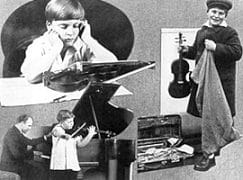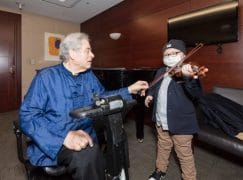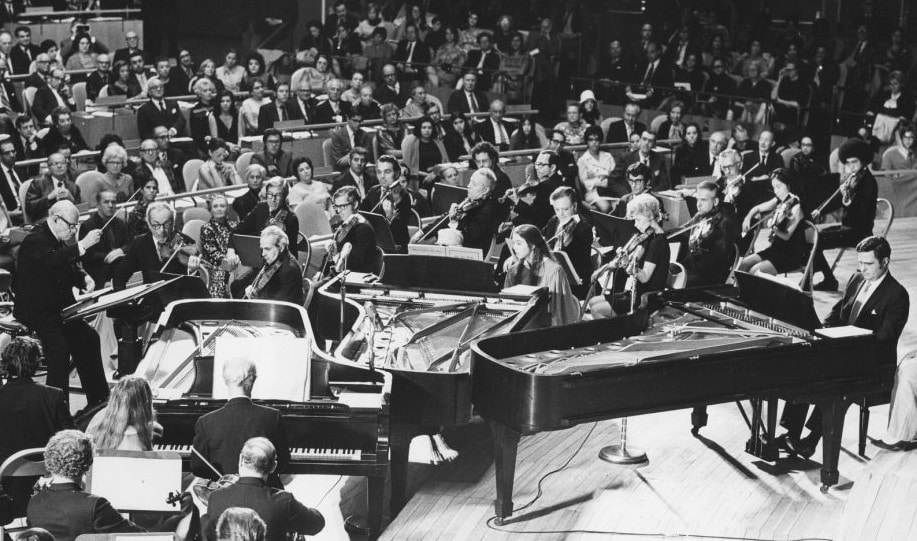The fate of two child prodigies at Harvard
mainIt is a universal truth, proved almost without exception, that children who are pushed prematurely into the public eye as performers seldom enjoy the same acclaim or fulfilment in adulthood.
And yet the parent keep pushing them.
Read here.






I think the emergence of genuine prodigies in music has nothing to do with the mad-dog parenting described here, nor do informed people see prodigies as living rebukes to the ordinariness of ordinary kids.
Prodigies’ brains, clearly, have been differently formed and they oftentimes seem spooky. Their differences are manifest very early, at ages four, five or six, and for those will will be instrumentalists, must be cultivated early or they will be lost. This is why so many who emerge into the public eye are children of musicians, or even better music teachers. Most of the world’s true prodigies, the far greater number, are never identified.
If music prodigies get the chance to hear music they are drawn to it like iron filings to a strong magnet. They don’t have to be forced to practice — indeed it can be an effort to direct their time or attention to anything else. They have access, at tiny ages, to a full range of human emotions, emotions not yet provoked or grounded in experience, which is why say a twelve-year-old can compete with adults many times their age in expressive ability.
Along with this goes some part of a basket of super-skills that include perfect pitch, ginormous memory, lightning-fast processing (sight reading with transcribing/transposing in real time, for larval pianists) and more.
They tend to lose contact with their age group, with whom they feel nothing in common, surrounded as they are with adult teachers and coaches, which is why you sometimes hear about them trying to invent their lost childhood later in life. There is no guarantee of professional success. As teenagers they can suddenly emerge from the cocoon and just walk away from music, maybe to return on their own years later, sometimes never — this can’t be forced. Their families experience great financial pressure; siblings resent the uneven distribution of attention &c &c.
But this is where the great players of tomorrow will come from, and above all the great composers (if we are to have great composers in the western classical tradition ever again) and this is why, in my opinion, we really truly need intensive effective music teaching for young children in this country and everywhere else too, why not, starting in kindergarten, doing and listening both.
PS: Early music education provide the complementary benefit: an audience.
Amen to that last part. We still don’t give enough attention to this: musical education for the general run of young schoolchildren – the simple learning of rudiments – the beginnings of note reading, the first steps on some instrument, the singing of parts in a choir – is the sine qua non of any future for what we call “classical music.” Both because that’s what allows talented future professionals to be discovered in time (if they don’t have musician parents to do the discovering), and because that’s what allows the young, developing ear to learn to hear musical relationships.
Without some version of that early exposure, a window closes later, and you predictably get people (not all, but many) who as adults can only really hear the melody and the bass. Or only the melody and the rhythm track. Or only the *words* and the rhythm track.
A lot of our current pop music – even though it has merits within its limits, even though there might be brilliant people doing some of it – is tailor-made for ears that simply don’t process multiple pitches heard together. In other words for ears that didn’t get those early experiences when the window of opportunity was open. Persuading adults like that to give classical music a try is a losing battle – they can’t hear the stuff we hope they will like in it.
It would be so easy to fix this if we could get agreement that the rudiments of music are just as important for schoolchildren as the rudiments of so many other things they may not use in adult life, like algebra, chemistry, athletics…..
Prodigies – as in those fields – are discovered when they show unusual aptitude, and that’s great. But if you don’t teach the subject to the whole classroom, you can’t find the standouts – and you can’t create the general public that will appreciate the standouts.
Final thought, since I’m writing a New Year’s resolution for the education system: this has nothing to do with privileging elitist music by dead white European males. It doesn’t matter what repertory is used for that early training – it only matters that the ear-to-brain connection is opened and reinforced. If that happens, Beethoven can take care of himself later – so can jazz – so can whatever future popular styles might exist that have more musical content than we’re generally getting at the moment.
Excellent deepening of the argument as well as explanation of the what-doesn’t-work why.
Ann Hulbert mistakenly accepts the “Tiger mom’s” assessment of her daughters as “naturals”, “near virtuosos”, and erroneously includes them in an article on prodigies. They were neither naturals nor virtuosos. And in no way comparable to the true prodigies cited in the first part of the article.
If she were looking for some what comparable Harvard alumni, she would have done better researching the parenting of Leonard Bernstein and Yo Yo Ma.
Totally agree with the comment that the true prodegy’s brain IS different and have observed that they pull their parents rather than being pushed, and for years have no other interest. It is the same with math prodigies.
Nota Klein, MD FAAP
“…children who are pushed prematurely into the public eye as performers seldom enjoy the same acclaim or fulfilment in adulthood.”
It’s a misleading thesis. This is not peculiar to child performers.
It is seldom that *anyone*… of any age… who enters the public eye retains that acclaim for very long.
That may well be true, but it does not in any way diminish the likelihood that “children who are pushed prematurely” enjoy later success even more rarely.
It’s a bit like revealing that, in Minneapolis, New Year’s Day is observed on January 1.
And note that “even more rarely” was not in thesis. That is something you want the cautionary tale to show, but it doesn’t.
And you may note that I never stated that “even more rarely” was there. My comment was in response to yours and not in defense of the “thesis”.